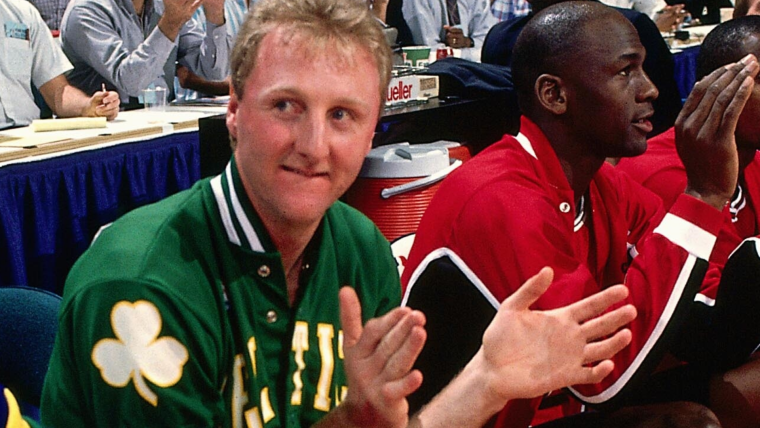Michael Jordan’s Smart Move: The Hilarious Rule to Avoid Larry Bird’s Trash Talk Revealed in New Book
In the realm of basketball legends, Michael Jordan’s wit and Larry Bird’s trash talk are legendary. A new book by Rafi Kohan, “Trash Talk: The Only Book About Destroying Your Rivals That Isn’t Total Garbage,” unveils an amusing anecdote showcasing how Jordan dealt with Bird’s notorious trash-talking skills.

The Untold Rule: Never Talk Trash to Larry Bird Michael Jordan, widely hailed as the greatest basketball player, understood the power of motivation. In Kohan’s book, it’s revealed that Jordan adopted a unique rule when it came to Larry Bird: never engage in trash talk with him. Recognizing Bird’s prowess as one of the best trash-talkers in NBA history, Jordan aimed to avoid providing him with any extra motivation.
An excerpt from “Trash Talk” recounts an incident when the young B.J. Armstrong, a new addition to the NBA, faced Bird’s taunts. Ready to respond, Armstrong was interrupted by Jordan himself, who declared, “Not a single person. Not one word. No one talk to Larry Bird.” Bird, in his distinctive Indiana drawl, pleaded, “C’mon, Michael. Let these guys get involved in it. Come on.”
The Essence of Trash Talk: A Test of Greatness Kohan delves into the psychological impact of trash talk, highlighting that top trash-talkers aim not only to weaken opponents but also to draw out their best performance. Bird, known for firing verbal barbs at opponents, would predict his moves before executing them. According to Armstrong, the best trash-talkers want their opponents to reach their peak because they believe their best is superior.
Jordan, too, developed a reputation akin to Bird’s as he rose to superstardom. “The Last Dance,” ESPN’s documentary series, highlighted Jordan’s ability to turn innocuous comments into deep motivations. Cheryl Miller noted that Jordan was off-limits for trash talk, given his long memory. Kohan points out Gary Payton as a rare exception during the 1996 NBA Finals.
Trash Talk as a Psychological Challenge Kohan’s book emphasizes that trash talk is a psychological test, presenting a challenge and raising the stakes of a confrontation. It puts pressure on opponents and oneself by elevating the significance of the encounter. The key question is whether both parties can handle the increased pressure or succumb to it.
Bird and Jordan consistently triumphed in these psychological challenges, making it clear that refraining from engaging in trash talk was often the wisest strategy. Kohan’s book provides deeper insights into the intricate dynamics of trash talk in sports, portraying it as more than mere banter but a strategic tool with psychological implications.
As of now, “Trash Talk” enjoys a high rating of 4.7 out of 5 stars on Amazon, indicating its popularity among readers.
